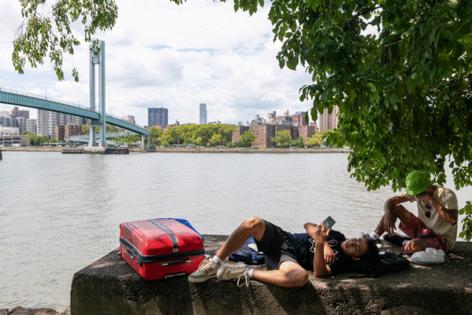Commentary: Why homelessness skyrocketed in 2024 – and what to do about it
Published in Op Eds
In 2024, the U.S. saw the largest spike in homelessness since the federal government began regularly collecting data in 2007. This wasn’t a fluke. U.S. homelessness has been on a steep and steady climb – and immigration is largely responsible.
U.S. homelessness hit record highs in both 2023 and 2024, in large part because of major increases in homelessness in New York, Illinois and Massachusetts. On their own, these states account for roughly two-thirds of the growth in homelessness in the U.S. last year.
What’s the common denominator? These states all house large cities (New York City, Chicago and Boston) that have declared themselves “sanctuary cities” and whose shelters have been inundated with soaring numbers of immigrants here illegally – causing the homeless population to skyrocket.
The U.S. Department of Housing and Urban Development’s annual homelessness report, released in December 2024, explains that New York City asylum seekers “accounted for almost 88 percent of the increase in sheltered homelessness in New York City.”
Nearly all (89%) of New York’s homeless are in New York City, and nearly all (96%) of the homeless in New York are considered sheltered. Thus, the influx of asylum seekers is largely responsible for the large growth in homelessness in New York City — and therefore for most of the state’s homelessness increase.
Illinois tells a similar story. There, 2024 brought a massive 116% increase in homelessness — the largest increase in the country. More than half of the increase in the state’s homeless population was due to an increase in immigrants in Chicago homeless shelters.
Massachusetts saw a 53% rise in homelessness in 2024, also greatly attributed to immigration.
The story of the rise in homelessness in 2024, particularly the rise in sheltered homelessness, very much revolves around illegal immigration.
In the coming months, policies addressing illegal immigration will likely reduce homelessness to some extent. But addressing the nation’s homelessness problems will require further changes.
Even before the increase in illegal immigration, unsheltered homelessness was on the rise. And sheltered homelessness has hardly budged since the federal government began consistently gathering homelessness data in 2007. Clearly, some solution is needed.
One important step is for federal policymakers to stop emphasizing “housing first” and instead address the underlying causes of homelessness.
For almost two decades, the federal government has favored funding programs that prioritize permanent supportive housing without barriers to entry (no requirements to participate in drug rehabilitation, job training, mental health treatment or work).
But these housing-first policies are very costly and often ineffective. In Los Angeles, for example, a housing-first project has cost the city $690,000 per unit. According to estimates from Kevin Corinth at the American Enterprise Institute, it takes 10 permanent supportive housing units to reduce homelessness by just one person. Do the math and this approach gets expensive very quickly.
Even more problematic, housing-first policies don’t help people overcome challenges like drug addiction, mental illness and unemployment. Like many government strategies designed to help the needy, these policies fail to address the underlying personal challenges people face.
Nor do they reduce overall rates of homelessness. The reason is unclear, but it could be because it incentivizes people to stay in permanent housing longer than they would have remained homeless, occupying units that would otherwise be available. People may also intentionally move to areas that provide permanent housing.
For all these reasons, HUD should change the language in their “notice of funding availability” so that they no longer prioritize housing first.
Reducing homelessness for U.S. citizens requires a mix of strategies suited to the needs of individuals. Shelter is important, but the goal of assistance should be to help people improve their lives and overcome barriers to employment and healthy functioning.
Instead of implementing housing-first programs, the government should promote treatment first programs (like those in the Birmingham Model), which pair temporary housing with programs like drug rehabilitation, mental health treatment and job training.
We should also work to improve services for those with severe mental illness.
Many living on the streets suffer from mental illness, but psychiatric beds are often in short supply. States and localities should increase the availability of psychiatric care for those with severe mental illness. State policymakers should also examine involuntary commitment laws to see that their policies don’t make it overly prohibitive for those with severe mental illness to get care.
While reducing homelessness requires more than good policies, it’s important to get the policy right. Fighting homelessness and reducing poverty require promoting upward mobility, not just issuing one-way transfers.
____
Rachel Sheffield is a Research Fellow in The Heritage Foundation’s Center for Health and Welfare Policy.
_____
©2025 Tribune Content Agency, LLC.




























































Comments